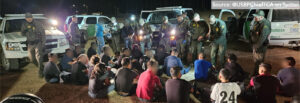To receive the digest in your inbox each month, please visit www.wola.org/sign_up
Peace in Sight: Is Colombia’s Deadly Armed Conflict Finally Coming to an End?
Colombia’s 51-year-long armed conflict may soon come to an end, after the Colombian government and the Revolutionary Armed Forces of Colombia (Fuerzas Armadas Revolucionarios de Colombia, FARC) came to an agreement on a framework for how to address human rights crimes committed during the conflict. As WOLA Senior Associate Adam Isacson mentioned in the Washington Post, the agreement on transitional justice was by far one of the most difficult issues, bringing the possibility of a lasting peace within reach. Since negotiations began three years ago, WOLA has been providing analysis and recommendations to high level actors involved in the peace talks, ensuring the voices of marginalized communities are taken into account at the negotiating table.
Justice Triumphs Over Corruption in Guatemala
On August 21, Guatemalan prosecutors and the UN-backed International Commission Against Impunity in Guatemala (Comisión Internacional contra la Impunidad en Guatemala, CICIG) implicated then President Otto Pérez Molina in a massive multi-million dollar customs fraud scheme. Pérez Molina resigned on September 2, was arrested hours later, and is due to stand trial in December.
WOLA was part of the coalition that pushed for the creation of the CICIG in 2006, setting the stage for the commission with a 2003 report, which according to the New Yorker, exposed just how deep the infiltration of organized crime in Guatemala’s state institutions was at the time. More recently, WOLA played a role in ensuring the CICIG’s two-year mandate was renewed this spring. In recent interviews with MSNBC and PBS Newshour, WOLA Senior Associate Adriana Beltrán said the commission’s successes have been unprecedented, and the courage of the Guatemalan people changed the course of their country.
Mexico’s 43 Disappeared Students: A Year Without Justice
On the night of September 26, 2014, local police violently pursued and attacked a group of students in Guerrero, Mexico; three students were killed, dozens were injured and 43 of them were forcibly disappeared. At the request of the victims’ families, their legal representatives, and the Mexican government, the Inter-American Commission on Human Rights established a Group of Independent Experts—which includes 2014 WOLA Human Rights Award Winner Claudia Paz y Paz—to provide technical assistance to the Mexican government to develop new lines of investigation, search for the students, provide attention to the victims, and address the broader problem of disappearances in Mexico.
Following six months of work, the Experts released a groundbreaking report which pointed to significant shortcomings in the Mexican government’s investigation, debunking the theory that the students’ bodies were burned at a trash dump and casting doubt on the alleged motive for the attacks.
WOLA has advocated for justice in this case since the students were disappeared and has supported the Experts' work to provide truth and reparations to their families. On the anniversary of these tragic events, WOLA remembered the many victims of this attack and called on the Mexican government to continue to work with the Experts and fully implement their recommendations.
A Drug Policy Success Story: Bolivia’s Innovative Strategy to Reduce Coca Cultivation
Bolivia has seen a decline in coca cultivation for the fourth consecutive year, making last year’s 20,400 hectares of coca the lowest in a decade. Unlike Peru and Colombia, the largest coca producers in the world, Bolivia does not use forced eradication techniques, which are ineffective and harmful to local communities.
Instead, Bolivia uses “cooperative coca reduction,” which relies on close monitoring of farmers to prevent legal coca yields from entering the black market, along with economic development strategies, according to WOLA’s new report, coauthored with the Andean Information Network (AIN). Bolivia’s coca policies are an effective and humane alternative to forced eradication, and the reduction numbers show that they work.
The 10th Annual WOLA Human Rights Awards
You are cordially invited to join WOLA on Wednesday, October 28th, at the Mayflower Renaissance in Washington, DC for our 10th Annual Human Rights Awards Ceremony and Benefit Gala. Last year was one of incredible impact for WOLA, and we hope you will join us as we celebrate these achievements. This year we will give our Human Rights Awards to Tim Rieser, Foreign Policy Aide to Senator Patrick Leahy, for his many years of dedication to advancing human rights throughout the Americas; and Justicia y Paz, the Inter-Church Commission for Justice and Peace from Colombia, for promoting the human rights of Afro-Colombian, indigenous, and rural farmer communities, and for working to hold perpetrators of abuses responsible for their crimes.
Every year, dedicated individuals, businesses, and organizations show their support for WOLA’s mission through this important event. WOLA offers various opportunities to be involved—sponsorships, advertisements, and tickets. With your presence or other forms of support for this event, you help advance human rights throughout the Americas.
WOLA Partners with the Washington Ballet for Latin-themed Week at the Kennedy Center
From October 14 to October 18, come celebrate Latin culture, music, and dance with WOLA at the Kennedy Center in Washington DC. The Washington Ballet will present the festivalLatin Heat, featuring exhilarating works by three of the biggest names in contemporary cinematography: Mauro de Candia, Annabelle Lopez Ochoa and Edwaard Liang. To purchase tickets, please click here.



